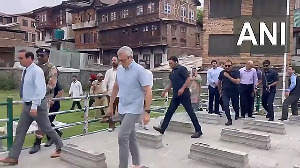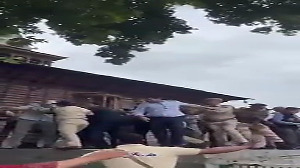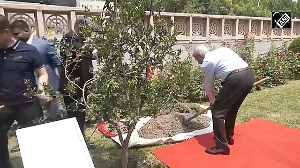Lawmakers were not going to be in town on that particular day, and would be in their constituencies preparing for the mid-term elections in November. Rediff.com’s Aziz Haniffa reports
 Indian Prime Minister Narendra Modi will not address a joint session of the United States Congress despite a concerted campaign by over 88 members of the US House of Representatives and 4 influential US Senators who had urged Speaker John Boehner to invite Modi to do so when he visits Washington, DC, in September.
Indian Prime Minister Narendra Modi will not address a joint session of the United States Congress despite a concerted campaign by over 88 members of the US House of Representatives and 4 influential US Senators who had urged Speaker John Boehner to invite Modi to do so when he visits Washington, DC, in September.
Boehner wrote to Modi, saying he would be welcome to address a joint meeting of Congress the next time he visits the US.
Boehner wrote, ‘Dear Mr Prime Minister, I write for the purpose of making you aware of the interest that exists in the US House of Representatives in inviting you to address a Joint Meeting of Congress at some future date. If not for the unpredictability of the House schedule in late September of this year, an invitation for you to address a Joint Meeting during your upcoming trip to the United States would have been extended. I would be very interested in exploring with you the possibility of a visit to the United States Capitol and an address to a Joint Meeting of Congress should your travels bring you back to our country in the months and years ahead.’
Sources told India Abroad that the main reason an address by Modi to a joint meeting to the House and Senate was cancelled was because of logistics of scheduling such a meeting. Lawmakers were not going to be in town on that particular day, and would be in their constituencies preparing for the mid-term elections in November.
The sources reiterated that there was no other reason, and that the anti-Modi lawmakers in Congress, led by Pennsylvania Republican Joseph Pitts, were not a reason.
The sources said that though the Congressional session was scheduled to end only October 2 after Congress returns from its summer recess, Boehner intended to end the session mid-September, so that lawmakers could return to their respective constituencies to campaign for re-election.
According to sources, Boehner (Republican, Ohio) had a particular vested interest because Republicans not only hoped to retain the House, but were also gung-ho about retaining the Senate majority from the Democrats.
Consequently, Boehner had informed the lawmakers -- who had spearheaded the campaign urging him to invite Modi -- that there was a logistics problem. And then he wrote to Modi.
At the time the House and Senate recessed, the House campaign spearheaded by Congressmen Brad Sherman (Democrat, California) and Eni Faleomavaega, (Democrat, American Samoa, India Abroad, August 1) had collected 88 signatures to prevail upon Boehner to invite Modi. The Indian-American community was also working on other Congressmen to co-sign the letter being circulated by Sherman and others.
But even before the Democrats jumped on the bandwagon led by Sherman and Faleomavaega, two influential Republicans, Congressmen Ed Royce and George Holding, from California and North Carolina respectively, had asked Boehner to invite Modi to address lawmakers.
Royce, chairman of the Foreign Affairs Committee, and Holding, also a member of the committee, had done so in early July. But sources told India Abroad that Boehner had indicated to these lawmakers then also that such a joint address couldn’t be scheduled because of the Congressional calendar.
Royce and Holding thus didn’t sign on the letter circulating in the House, driven by Sherman and Faleomavaega. Meanwhile, 4 influential US Senators -- including the Democratic and Republican co-chairs of the Senate India Caucus -- who introduced a bipartisan resolution expressing the importance of strengthening the US-India strategic partnership, and included in it a request to invite Modi to address a joint session of Congress, also couldn’t get much traction in the form of co-sponsors because the Senate had recessed.
The bipartisan resolution by US Senators Mark Warner (Democrat, Virginia) and John Cornyn (Republican, Texas) -- the Senate India Caucus co-chairs -- and Tim Kaine (Democrat, Virginia) and Jim Risch (Republican, Idaho), had also urged President Barack Obama to nominate an ambassador to India as quickly as possible.
Warner said, ‘We have already seen progress in the US-India relationship under the new Indian government, including the Pentagon naming Frank Kendall to lead the Defence Trade and Technology Initiative, lifting the cap on foreign direct investment in defence and insurance, a new emphasis on the US-India community college initiative, and convening the a US-India Strategic Dialogue in Delhi this week.’
Warner, who had called for these actions in his First-100 days Plan of the Modi administration, said, ‘This resolution will continue the positive trajectory that the First-100-days-plan established.’
Cornyn said, ‘The relationship between the world’s oldest and the world’s largest democracies continues to hold tremendous potential, and there is strong bipartisan support for expanding US-India cooperation going forward.’
Kaine, who chairs the Senate Foreign Relations Subcommittee on South Asian Affairs and last month convened a hearing titled, ‘Indispensable Partners -- Re-energising US-India Ties,’ said, ‘This resolution sends a strong signal about the importance of the US-India Strategic Partnership and the bipartisan support the relationship enjoys on Capitol Hill.’
Echoing his colleagues’ sentiments, Risch said, ‘The US-India Relationship is of great importance to me and the people of Idaho. The Idaho National Lab has been a leader in this relationship, especially through leading the technical nuclear cooperation between our countries.’
Aides to these senators told India Abroad that once the senate reconvenes they were confident they could garner support for this resolution to get it adopted. Although logistics may have put paid Modi addressing a joint session, they said, this was only one component of the resolution which was broader in its content, particularly its call that both the US and India infuse momentum into the partnership to make it strategic in tangible terms.
Administration sources also told India Abroad that the nomination of an ambassador to India was also unlikely anytime soon and perhaps would only be made after the mid-term election in November. So that Obama would be confident of an early senate -- which some predict could end up with a Republican majority -- confirmation.
Last month, Assistant Secretary of State for South Asian Affairs Nisha Desai Biswal, asked by lawmakers on the status of the ambassadorial nomination, said, ‘It’s going through its internal process at the White House.’











